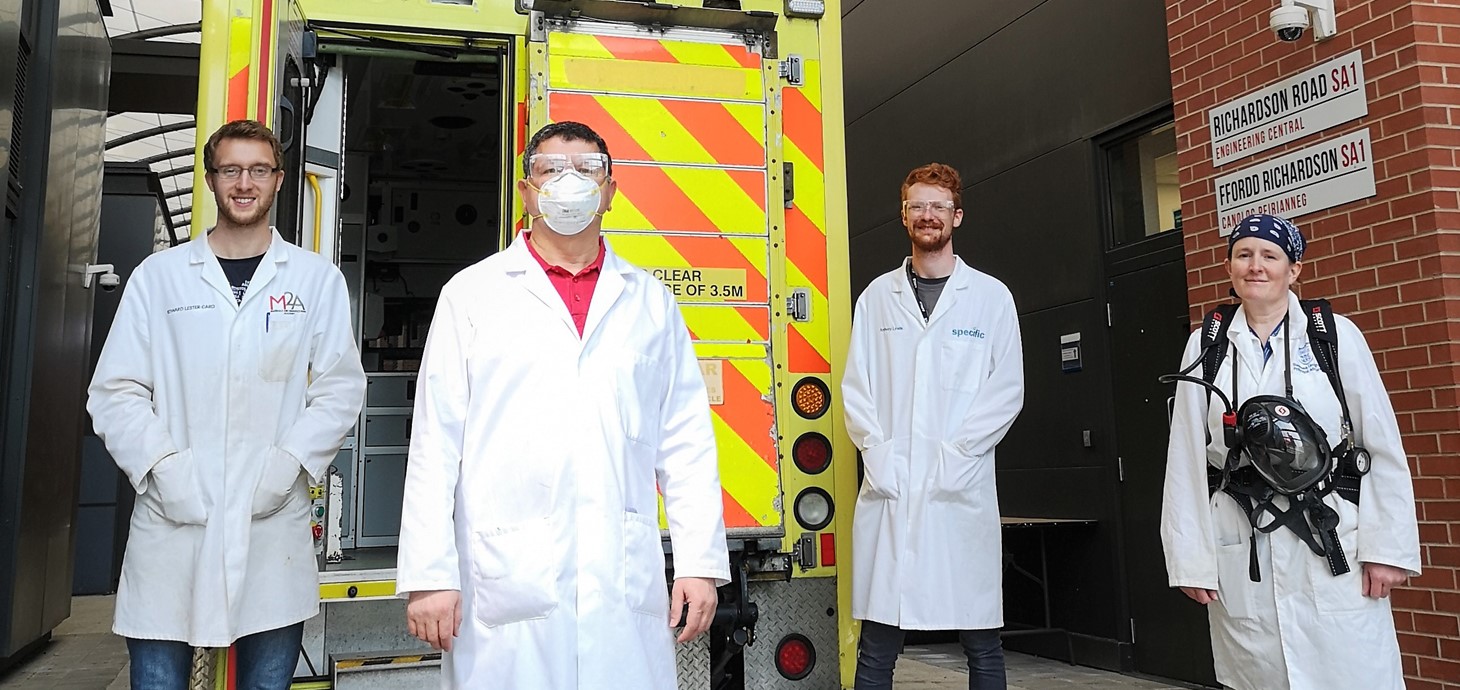These articles are now archived and will no longer be updated.

(L-r) Ed Lester-Card, Dr Chedly Tizaoui, Anthony Lewis and Dr Karen Perkins of Swansea University College of Engineering, with the demonstration ambulance used to test out their speed-cleaning procedure
Swansea University has successfully won funding to reduce the time it takes to sanitise ambulances after carrying a suspected Covid-19 positive patient.
Students from the university are helping slash the time it takes to clean an ambulance from 45 minutes to under 20 minutes.
Led by the Small Business Research Initiative (SBRI) Centre of Excellence and Welsh Ambulance Service, the challenge was to reduce the current turnaround time to deep clean a vehicle and get it back on the road.
Devised and developed in under two weeks, interest in the challenge was overwhelming, with over 200 proposed solutions from across the UK. Swansea University were among the twelve top ranked bids securing funding and support, a testament to the ingenuity and enterprise being applied to issues arising from the crisis.
Swansea University’s solution will see them test a new rapid-release gas treatment for ambulances, which could remove Covid-19 contamination from surfaces and the air, in under twenty minutes, removing human cleaning intervention.
Support for the challenge has been provided by the Defence and Security Accelerator (DASA) and government scientists based at Porton Down.
If trials are successful, it could also be rolled out for other blue light services, public transport and hospital wards.
Kirsty Williams, the Minister for Education, said:
“Our universities and colleges have been at the forefront of the battle against the coronavirus, deploying doctors and nurses to the NHS frontline and joining the international effort to find a cure.
“As a Government, we are exploring many routes to help combat the coronavirus. Working with Welsh and UK partners, this competition shows how innovation can be applied quickly to emergency situations.
“I’m proud that a Welsh University has got through to the funding stage of the competition, demonstrating how our universities apply their academic expertise to meet the biggest challenges we face.”
Minister for Economy, Transport, and North Wales Ken Skates, said:
“We are all playing a role in helping to slow the spread of coronavirus, and we’ve seen examples all over Wales of people coming together to face the challenges this virus continues to pose each day.
"Our businesses and universities are no different in jointly rising to these challenges and I am grateful to everyone involved in this innovative collaboration for the speed in which they were able to respond.”
Dr Chedly Tizaoui of Swansea University, chemical engineer and Principal Investigator of the project said:
“Swansea University are delighted to be working with the support of the Welsh Ambulance Service, Welsh Government and the Welsh SBRI Centre of Excellence to deliver a potential rapid solution for ambulance cleaning.
It is a great opportunity for us to assist front line services and our Health colleagues in the fight against Covid19.”
As the principal investigator, Dr. Tizaoui will be working on the project with colleagues Professor Dave Worsley and Professor Peter Holliman.
Small Business Research Initiative (SBRI) specify a problem – but not the solution facing the public sector. It’s then up to businesses, entrepreneurs, inventors or universities to step forward with proposals, the best of which win funding to test trial.
Story from the Welsh Government
